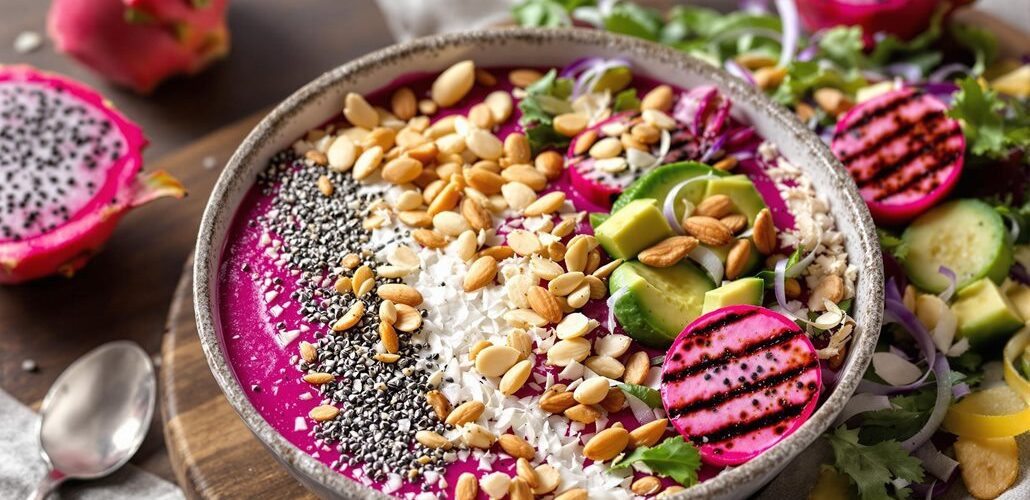
Incorporating dragon fruit into a keto diet can be both flavorful and healthy when mindful of its carbohydrate content. This tropical fruit provides approximately 12 grams of carbohydrates per 100 grams, with 9 grams being net carbs. Rich in vitamin C, antioxidants, and fiber, dragon fruit supports immune function and digestive health while being low in calories. To maintain ketosis, limit servings to 100-150 grams and pair with low-carb ingredients. Its versatility allows for creativity in smoothies, salads, or low-carb desserts. Strategic portion control and culinary creativity are key to enjoying dragon fruit within keto parameters. Discover various ways to integrate it seamlessly into your keto lifestyle.
Key Takeaways
- Limit dragon fruit portions to 100-150 grams to manage carb intake and maintain ketosis.
- Pair dragon fruit with low-carb ingredients like spinach or avocado to balance meals.
- Use dragon fruit in smoothies, salads, and desserts for vibrant color and flavor.
- Track carbohydrate intake using dietary apps to avoid exceeding daily keto limits.
- Choose fresh, organic dragon fruit to enhance flavor and nutritional benefits.
Dragon Fruit Nutrition
When evaluating the nutritional profile of dragon fruit, it becomes evident that this vibrant fruit can be a valuable addition to a keto diet. The ketogenic diet, known for promoting weight loss and appetite regulation, aligns well with dragon fruit's nutritional benefits.
Dragon fruit nutrition reveals that, at approximately 57 calories per 100 grams, it is a low-calorie choice for those seeking a nutritious yet keto-friendly snack. The carbohydrate content is notable, with around 12 grams per 100 grams, of which natural sugars contribute 9 grams, and dietary fiber accounts for 3 grams. This results in a manageable 9 grams of net carbs per 100 grams, aligning well with the low-carb requirements of a ketogenic diet.
In addition to being low in carbs, dragon fruit is rich in essential nutrients, particularly Vitamin C, providing about 4.3 mg per 100 grams. This vitamin plays a significant role in supporting immune function and overall health.
Furthermore, the fruit contains important minerals like magnesium and iron, which are essential for energy production and red blood cell formation. With its high water content—approximately 83.96 grams per 100 grams—dragon fruit also promotes hydration, making it a rejuvenating and healthful choice within the constraints of a keto lifestyle.
Health Benefits Overview
Building on the nutritional profile of dragon fruit, its health benefits are remarkable, particularly for those adhering to a keto diet. Importantly, dragon fruit is low in calories, with only about 57 kcal per 100 grams, making it an ideal low-calorie addition to any ketogenic diet plan.
Its carbohydrate content is balanced by approximately 3 grams of dietary fiber per 100 grams, helping manage carb intake while promoting digestive health. The fiber content supports gut health, which is vital for overall well-being.
Rich in vitamin C, dragon fruit provides around 4.3 mg per 100 grams, contributing to enhanced immune function and skin health. This vitamin C content is beneficial for those seeking to maintain a robust immune system while adhering to dietary restrictions.
Additionally, dragon fruit is packed with antioxidants and omega fatty acids, which may reduce inflammation and support cardiovascular health.
With its low glycemic index, dragon fruit aids in managing blood sugar levels, offering a suitable choice for individuals closely monitoring their carb intake. This characteristic is particularly advantageous for those on a ketogenic diet, seeking to maintain steady blood sugar levels.
Keto Compatibility
Steering through the compatibility of dragon fruit with a ketogenic diet requires a careful balance of nutritional awareness and portion control.
With its approximately 12 grams of carbohydrates per 100 grams, dragon fruit necessitates mindful integration into keto meals to maintain the low-carb diet's standards. Its carbohydrate content, primarily composed of about 9 grams of sugar and 3 grams of dietary fiber, results in approximately 9 grams of net carbs. This net carb value makes dragon fruit a potentially viable option for keto compatibility when consumed in moderation.
Maintaining ketosis, a state where the body shifts from burning sugar to fat, hinges on portion control, especially given that a 200-gram serving of dragon fruit delivers 24 grams of total carbs and 18 grams of net carbs.
Despite this, dragon fruit's nutritional benefits, including vitamins and antioxidants like vitamin C, can enhance a keto diet without significant disruption if portions are managed carefully.
Consider these tips for keto compatibility:
- Use dragon fruit sparingly within smoothies or salads.
- Incorporate it into low-carb desserts.
- Monitor total carbohydrate intake closely.
- Balance dragon fruit with other low-carb ingredients.
- Leverage its dietary fiber to complement keto meals.
Portion Control Tips
Effective portion control is essential when incorporating dragon fruit into a keto diet due to its carbohydrate content.
Considering that various fruits and snacks can quickly disrupt ketosis, a 200-gram serving of dragon fruit can contain approximately 18 grams of net carbs.
As a result, it is advisable to limit portions to 100-150 grams to maintain dietary balance.
Utilizing measuring tools or a food scale can aid in accurately tracking your carb intake, ensuring dragon fruit remains a beneficial component of your nutritional regimen.
Monitor Serving Sizes
When integrating dragon fruit into a keto diet, it is essential to regularly monitor serving sizes to maintain nutritional balance and support ketosis. Dragon fruit, while nutritious, contains approximately 12 grams of carbohydrates per 100-gram serving, with 9 grams being net carbs.
To avoid disrupting your ketosis, it is vital to limit your carbohydrate intake by carefully managing portion sizes. Utilizing a food diary or dietary tracking tools can aid in accurately logging your total carbohydrate intake, ensuring dragon fruit consumption remains within your daily carb limit of 20-50 grams.
Proper portion control is imperative when incorporating dragon fruit into your meals. A larger serving of 200 grams could considerably increase your carbohydrate intake to 24 grams, potentially surpassing your daily allowance.
To prevent overconsumption, use kitchen scales or measuring cups to measure precise servings. Additionally, consider pairing dragon fruit with low-carb foods to balance its nutritional content while enhancing the overall flavor of your dish.
- Use kitchen scales to measure dragon fruit portions accurately.
- Keep a food diary to track daily carbohydrate intake.
- Limit dragon fruit to 100 grams per serving.
- Combine with low-carb ingredients to maintain balance.
- Monitor portion sizes to support ketosis.
Track Carb Intake
Maintaining ketosis requires diligent attention to carbohydrate intake, especially when incorporating fruits like dragon fruit into your diet. Dragon fruit, with its vibrant nutritional profile, can be a delightful addition to your keto diet, but its carbohydrate content necessitates careful monitoring. A 200-gram serving of this fruit contains approximately 24 grams of total carbs and 18 grams of net carbs, making it imperative to track carb intake precisely to stay within your daily carb limit, typically between 20 to 50 grams for ketosis maintenance.
Portion sizes play a critical role in managing your carb consumption. Utilizing dietary tracking tools or apps can help log your carbohydrate intake efficiently, ensuring that dragon fruit consumption remains within your personal dietary constraints.
To balance your meals while keeping carb counts in check, consider pairing dragon fruit with low-carb ingredients such as spinach or avocado. This combination not only enhances nutritional diversity but also mitigates the risk of exceeding your carb targets.
Additionally, be vigilant about hidden carbs in accompaniments like sauces or dressings, which can inadvertently increase your net carb intake. By adhering to these strategies, dragon fruit can be enjoyed responsibly within your keto regimen.
Creative Meal Ideas
Incorporating dragon fruit into your keto diet can be both delicious and innovative, particularly in the domain of smoothies and low-carb desserts.
For a nutrient-rich beverage, blend dragon fruit with spinach, almond milk, and berries to create a smoothie that aligns with keto guidelines.
Additionally, consider crafting a dragon fruit chia pudding using coconut milk and chia seeds, offering a visually appealing and satisfying dessert option that maintains low carbohydrate content.
Dragon Fruit Smoothie Recipes
Although often overlooked in keto meal planning, dragon fruit offers a versatile and nutritious option for smoothies that can fit well within a low-carb lifestyle.
A dragon fruit smoothie can be easily incorporated into ketogenic diets by combining 100 grams of dragon fruit with 200 ml of unsweetened almond milk and a handful of spinach. This combination results in a low-carb smoothie with approximately 12 grams of carbohydrates and 5 grams of fiber, leveraging the nutritional benefits of dragon fruit.
For those seeking a tropical twist, blend frozen dragon fruit with coconut milk and a scoop of protein powder to enhance healthy fats and maintain low net carbs.
To further enrich your keto recipes, consider the following:
- Avocado Addition: Add 50 grams of avocado for creaminess and increased healthy fat content.
- Chia Seeds: One tablespoon adds fiber and omega-3s with minimal carb impact.
- Greek Yogurt Blend: Mix with unsweetened Greek yogurt and stevia for a creamy treat with 8 grams of net carbs.
- Protein Boost: Incorporate a scoop of protein powder for a satiating snack.
- Texture Variation: Experiment with blending different leafy greens for added fiber content.
These options make incorporating dragon fruit into your keto diet both delicious and nutritious.
Low-Carb Dessert Innovations
Dragon fruit, with its vibrant color and subtle sweetness, presents an innovative approach to creating low-carb desserts that align with a ketogenic lifestyle. A delectable dragon fruit mousse can be achieved by blending the fruit with unsweetened coconut cream and erythritol. This low-carb dessert adheres to keto guidelines while delivering a tropical flair.
Another option is dragon fruit chia pudding, a nutrient-dense choice that combines dragon fruit puree with chia seeds and unsweetened almond milk. This dessert is both visually appealing and high in fiber, making it a suitable treat for those mindful of net carbs.
For a invigorating and hydrating option, dragon fruit popsicles can be crafted by blending the fruit with lime juice and a low-carb sweetener. Freeze the mixture in molds for a guilt-free indulgence.
To satisfy sweet cravings, dragon fruit cheesecake bites mix the fruit with cream cheese and an almond flour crust, creating a deliciously low-carb dessert.
Keto-Friendly Alternatives
When searching for keto-friendly alternatives to dragon fruit, some may find that certain fruits naturally lend themselves to a low-carb diet. Understanding the carb content of various fruits is vital for effective carb counting and maintaining ketosis.
For instance, strawberries and raspberries are prime examples, with strawberries containing approximately 7.7 grams of carbs per 100 grams and raspberries around 11.9 grams. These fruits offer a favorable nutritional profile for those on a keto diet due to their lower net carbs.
Additionally, avocados are an exceptional choice, providing roughly 9 grams of carbohydrates per 100 grams, but with high fiber content, they effectively deliver only 2 grams of net carbs. Avocados are especially beneficial as they are rich in monounsaturated fats that promote heart health.
Non-starchy vegetables like spinach and kale can also complement these fruit options to guarantee a balanced intake of essential nutrients.
To further diversify your keto-friendly fruit options, consider incorporating the following:
- Blackberries: 9.6 grams of carbs per 100 grams, with 4.3 grams of net carbs.
- Coconut: 15 grams of carbs per 100 grams, with 6 grams of net carbs.
- Cherries: Approximately 12 grams of carbs per 100 grams.
- Watermelon: Around 7.5 grams of carbs per 100 grams.
- Avocados: 9 grams of carbs per 100 grams, with high fiber reducing net carbs.
These low-carb fruits can enhance your keto diet while allowing for enjoyable portion sizes without exceeding daily carb limits.
Ingredient Quality Matters
Selecting the right ingredients is a cornerstone of maintaining a successful keto diet, especially when considering the incorporation of fruits like dragon fruit. Ingredient quality is paramount, as it directly impacts both health benefits and dietary goals. Opting for organic dragon fruit is recommended to guarantee higher nutrient quality and minimize pesticide exposure. Fresh, ripe specimens should be selected for their vibrant color and firm texture, assuring ideal flavor and nutritional value.
| Preferred Option | Considerations |
|---|---|
| Organic Dragon Fruit | Higher nutrient quality, pesticide-free |
| Whole Dragon Fruit | Avoids added sugars and preservatives |
| Sourced from Sustainable Farms | Supports ecological and health goals |
When choosing dragon fruit, prioritize whole dragon fruit over packaged products to avoid added sugars and preservatives that can increase carb content and disrupt ketosis. Evaluating labels is essential; packaged products often contain undesirable additives. In addition, sourcing from sustainable farms that practice environmentally friendly methods not only supports ecological well-being but also aligns with the health-focused principles of a keto diet. By considering these factors, one can incorporate dragon fruit effectively into a keto regimen, balancing taste with nutritional integrity while supporting broader environmental objectives.
Monitoring Carb Intake
Mindfulness in dietary choices plays an essential role in the success of a keto diet, particularly when incorporating fruits like dragon fruit, which are naturally higher in carbohydrates. Monitoring carb intake is critical, as dragon fruit contains around 12 grams of carbohydrates per 100 grams, with a significant portion being sugars.
A typical 200-gram serving of dragon fruit has approximately 18 grams of net carbs, potentially consuming a large part of one's daily carb limit of 20-50 grams recommended for ketosis. Consequently, accurate measurement of portion sizes is fundamental to avoid surpassing this limit.
It's also important to emphasize whole foods over processed alternatives to maintain ideal nutrition and enhance the ketogenic experience. Effective food tracking can assist individuals in maintaining their keto lifestyle. Logging the grams of net carbs and keeping an eye on hidden carbs in other ingredients used with dragon fruit, such as in smoothies or salads, facilitates better dietary management.
Here are some strategies for successful monitoring:
- Use dietary tracking apps to record carbs per serving.
- Measure portions accurately to prevent exceeding daily carb limits.
- Be aware of hidden carbs in mixed dishes.
- Adjust other meals to accommodate dragon fruit intake.
- Regularly review net carbohydrate content in all foods consumed.
Such practices help guarantee that dragon fruit can be enjoyed without compromising keto goals.
Culinary Exploration
Culinary exploration with dragon fruit on a keto diet offers a unique opportunity to blend creativity with nutritional mindfulness. The versatility of dragon fruit allows it to be incorporated into various keto recipes while being mindful of portion sizes to manage carb intake effectively. Its vibrant color and mild sweetness make it a rejuvenating addition to smoothies, where it pairs well with keto-friendly ingredients like spinach and almond milk. This combination not only enhances the drink's nutritional value but also keeps the carbs in check.
For a delightful mix of flavors, consider adding dragon fruit to salads. When combined with avocado and cucumbers, it creates a visually appealing dish that harmonizes sweet and savory elements, enriching both taste and texture. Additionally, dragon fruit can transform into a delectable component of low-carb desserts, such as chia pudding or parfaits with macadamia nuts, providing a satisfying treat that aligns with keto principles.
| Recipe Type | Ingredients |
|---|---|
| Smoothies | Dragon fruit, spinach, almond milk |
| Salads | Dragon fruit, avocado, cucumbers |
| Low-Carb Desserts | Dragon fruit, chia seeds, macadamia nuts |
Frequently Asked Questions
Can I Eat Dragon Fruit in Keto?
Dragon fruit, with its antioxidant properties and low glycemic index, can be included in keto-friendly recipes like smoothies. Its nutritional value and health benefits make it a viable option through careful portion control and strategic meal planning.
Can You Lose Weight on Dragon Fruit Diet?
The weight loss benefits of a dragon fruit diet stem from its low calorie recipes, rich fiber content impact, and antioxidant properties. This tropical fruit variety offers keto friendly snacks and hydration benefits, supporting portion control tips and effective meal prep ideas.
Is Dragon Fruit High in Carbs?
Dragon fruit nutrition reveals it as a moderate-carb tropical fruit with 9 grams of net carbs per 100 grams. Its fiber content and antioxidants benefit health, making it a keto-friendly option in low-carb snacks and meal planning.
What Is the Lowest Carb Fruit for Keto?
Acai berries, with only 7 grams of carbohydrates per 100 grams, are the lowest carb fruit for keto enthusiasts. Their high fiber content reduces net carbs to 2 grams, making them ideal for keto-friendly snacks and healthy desserts.
Conclusion
Incorporating dragon fruit into a ketogenic diet necessitates a careful balance of portion control and nutritional awareness. Despite its relatively higher carbohydrate content, dragon fruit offers numerous health benefits, including antioxidant properties and fiber content. Utilizing creative meal ideas and keto-friendly alternatives can enhance dietary variety while maintaining ketosis. Emphasizing ingredient quality and closely monitoring carbohydrate intake are essential for optimizing health outcomes. Overall, dragon fruit can be a nutritious addition to a keto regimen when consumed mindfully.









No Comments